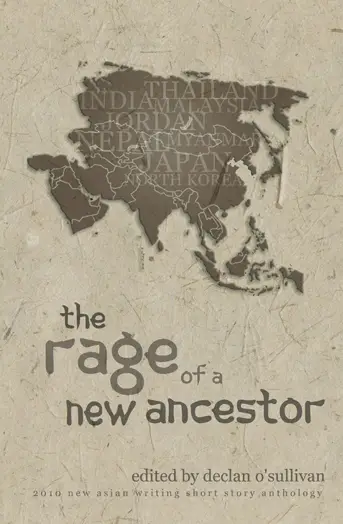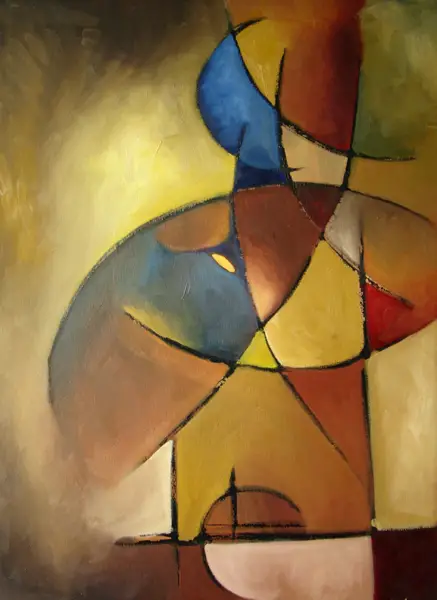 The Rage of a New Ancestor. 2010 New Asian Writing Short Story Anthology by Declan O’Sullivan (ed.) is made up of 14 short stories set in 10 different Asian countries. Cover design by Singaporean artist Fena Lee and illustrations by Thai-British artists Katherine Jones.
The Rage of a New Ancestor. 2010 New Asian Writing Short Story Anthology by Declan O’Sullivan (ed.) is made up of 14 short stories set in 10 different Asian countries. Cover design by Singaporean artist Fena Lee and illustrations by Thai-British artists Katherine Jones.
The New Asian Writing project was launched on January 1st, 2010 and has, since then, seen its ups and downs, with several changes of format and structure. However, we believe that this is an inherent part of any project that is set up from genuine passion of the heart and mind rather than being based on purely financial benefits. This second edition is published with a new cover design by Singaporean artist Fena Lee and a few minor layout changes.
There are probably hundreds, if not thousands, of anthologies that have been established where emerging writers can submit their literary work. Therefore, building a readership and recruiting a group of dedicated contributors was not an easy task. Luckily, everyone involved, no matter if they are readers, writers or publishers have acknowledged by now the importance of the World Wide Web and the endless opportunities it provides.
Thus, a very small group of short story fiction lovers based in Bangkok, Thailand, have set up www.new-asian-writing.com; a blog-like website where we encourage gifted, aspiring authors to submit their best short stories to be considered for inclusion in an end of year anthology. As with everything else in the 21st Century, we can no longer encompass the intellectual spectrum of the entire Renaissance movement, so we narrowed the theme of the anthology down to “All Things Asian.” We believe it is a wide enough theme that does not inhibit the writers’ creativity and gives them enough freedom to express themselves without chaining their imagination to any set of restrictive rules.
The 2010 New Asian Writing Short Story Anthology bears the title of the first short story in the collection, The Rage of a New Ancestor, because we believe that it happens to hold the strength of the very message we would like to send out to our readers and writers alike. We feel that the phrase The Rage represents the energy of the anthology which is keen to promote the creation of brand new short story material, focusing on imaginative fiction. The last phrase, New Ancestor, implies that this new anthology will now set the ball rolling to eventually establish a secure home for some quality literary work in the genre of solid short story fiction, that has been written with a specifically Asian flavour, and placed in a meaningful and contemporary setting within that continent.
 The fourteen short stories that make up this collection are the labour of writers from very different backgrounds and various parts of the world, each one written with an attentive eye turned towards the Asian world they have experienced or lived in. Both native and non-native speakers of English language, from Indonesia, Singapore, India, Jordan, the United States of America, Malaysia, Thailand, Nepal, Romania, and England have sent their contributions to the New Asian Writing anthology, thus helping us to bring together distinct voices from a vast array of geographic locations.
The fourteen short stories that make up this collection are the labour of writers from very different backgrounds and various parts of the world, each one written with an attentive eye turned towards the Asian world they have experienced or lived in. Both native and non-native speakers of English language, from Indonesia, Singapore, India, Jordan, the United States of America, Malaysia, Thailand, Nepal, Romania, and England have sent their contributions to the New Asian Writing anthology, thus helping us to bring together distinct voices from a vast array of geographic locations.
They have all experienced, at one time or another, different parts of Asia and have returned to their writing desk full of desire to write about all things Asian. Their short stories are set in India, Jordan, Thailand, Malaysia, Japan, Nepal, North Korea, and Myanmar (Burma). We believe that it is an auspicious event for the first ever edition, where four of the fourteen short stories that are included are set in Thailand, the very country where the New Asian Writing project is based, and has recently emerged onto the world literary scene.
For the editor, the main task was to make sure that all the contributions followed the same linguistic standards to be confident that they were ready for publication, but the editor tried immensely to not directly interfere with each writer’s specific and personal literary style. It was not an easy job, but eventually the dialogue between the writer and the editor created very fruitful results which you can witness as the reader, between the front and back covers of this anthology.
The short story that opens this year’s anthology, The Rage of a New Ancestor by Pranav S. Joshi from Singapore, follows two parallel storylines which eventually come together as one. While Indian tribesmen prepare to meet a politician who wants the villagers to vacate their land to make space for a government dam project, Kuru is living out his final moments of this world as an ostracized and impoverished pariah in his own community. Little did the tribesmen know that all their problems will be “resolved” by Hola, Kuru’s teenaged and malnourished daughter. The next story, Adolescence, by Mohammad Aljarmoshi from Jordan, describes the main character’s confusing attraction, his aesthetic love and primordial desire for Fairouz, a neighbour whom he spies upon every morning, before he goes to work.
 An Accident on Route 2 by Voicu Mihnea Simandan from Romania is about Thanapol Somchai, a Thai man who, on his return home from a business trip in northern Thailand, is involved in a fatal road accident en route. Believing that it was not his fault, he designed a plan to get rid of the body of the accident victim and then safely return to his wife and son. The consequences allude to how one act can lead to another in an entirely uncontrollable dominoes effect. True Friendship by J.C. Martin from Malaysia is the heartfelt story of Aisha and May, two very close friends who, after they graduate from high school, go their separate ways. Nevertheless, their friendship never loses its intensity and stands the test of time, with a very moving and poignant conclusion.
An Accident on Route 2 by Voicu Mihnea Simandan from Romania is about Thanapol Somchai, a Thai man who, on his return home from a business trip in northern Thailand, is involved in a fatal road accident en route. Believing that it was not his fault, he designed a plan to get rid of the body of the accident victim and then safely return to his wife and son. The consequences allude to how one act can lead to another in an entirely uncontrollable dominoes effect. True Friendship by J.C. Martin from Malaysia is the heartfelt story of Aisha and May, two very close friends who, after they graduate from high school, go their separate ways. Nevertheless, their friendship never loses its intensity and stands the test of time, with a very moving and poignant conclusion.
Going Home by Mithran Somasundrum from England is a story about Martin Catchpole, an Englishman who has been living in Japan for twelve years, and feels alienated in both Japan and in his home country. The tale details the connotations of his decision to finally go home. In order to make a clean break, he is willing to give away for free his entire belongings to the first person who answers the request he left on a noticeboard. Which path does he choose to take? Is his decision eccentric, or simply straightforward? Happis Grills by Joie Bose Chatterjee from India is a tale which has a very strong historical feeling to it, written using the idiosyncrasies of Indian English. Sahib, a Bangladeshi immigrant, works in a dilapidated Indian restaurant, owned by Roy. The frequent flashbacks to a bygone colonial era, when Roy used to serve fried fish to elegant Englishmen regularly haunt the owner. Until, one day, he falls asleep in the restaurant. Upon awakening, he seems to have been overcome with nostalgia, having experienced some hallucination by visualising certain images. This event proves to be a very liberating turning-point in his life. Has he been released from his mental chains, or will he still remain obsessed and seemingly possessed by India’s previous colonial ruler? Can true freedom be spiritual rather than just something physical?
Ghosts in the Classroom by Paul King from the USA revolves around the Thai Buddhist’s widespread belief in the existence of ghosts. When one of the narrator’s Thai students has an epileptic seizure during a lesson, everyone in the school seems to believe that a ghost possessed the student’s body. Will the narrator succumb to the seemingly strange belief in ghosts and forget his Western upbringing? Or will he interpret the ghost’s manifestation as a sign, with a far deeper meaning? I Woke Up Last Night and I Cried by Sushma Joshi from Nepal is the melancholic story of a young married couple who, due to financial problems, have had to live hundreds of miles away from each other, while the children can only stay with one parent. The theme carries great weight when one relates it to the contemporary economic recession going on throughout the world, and how the repercussions of this situation can immediately affect the happy, domestic family-life scenario.
 Viper by Giacomo Lee from England is a fascinating tale based in North Korea. A high ranking official believes he is guilty of having caused much suffering to the majority of the population and starts believing that the regime leadership is pursuing him to punish him for his deeds. The tale is somewhat philosophical, while simultaneously surreal. It is, indeed, thought provoking. Mangoes by Trirat Petchsingh from Thailand is the story of a lorry driver who smuggles tin ore from the deep jungles of Chiang Mai. The story offers vivid descriptions of the vast vegetation found in northern Thailand. However, the tale also emphasises the fuller implications of corrupt activities, when criminals aim to pay off the authority figures in order to sneak the contraband goods through the official police check points.
Viper by Giacomo Lee from England is a fascinating tale based in North Korea. A high ranking official believes he is guilty of having caused much suffering to the majority of the population and starts believing that the regime leadership is pursuing him to punish him for his deeds. The tale is somewhat philosophical, while simultaneously surreal. It is, indeed, thought provoking. Mangoes by Trirat Petchsingh from Thailand is the story of a lorry driver who smuggles tin ore from the deep jungles of Chiang Mai. The story offers vivid descriptions of the vast vegetation found in northern Thailand. However, the tale also emphasises the fuller implications of corrupt activities, when criminals aim to pay off the authority figures in order to sneak the contraband goods through the official police check points.
Eternal Smile by Caecilia Xie from Indonesia is the story of Hina, a young Japanese schoolgirl who struggles with untold love, family problems and school work. Although she meets a tragic end, her eternal smile seems to have brought joy to the life of the people she had interacted with. The story displays tension in the family and tension in the teenage boy-girl relationship scene, but shows how certain things can change the atmosphere one lives in. Does the Yin-Yang cycle include every age group, in every aspect of life? A Home – Away from Home by Uma Balu from India is the emotional story of Caroline, a German research scholar who, on her first trip to India, falls in love with Bheem, a mysterious and elusive young man. After the date for their wedding is confirmed, Caroline returns to Germany. When the day of their wedding finally arrives, Caroline travels once again to India only to find out the shocking truth about Bheem’s character and his true personality. Her fortitude is both spiritual and inspirational.
Based very loosely on the true story of when John Yettaw, an American citizen who swam across a lake to illegally visit Aung San Suu Kyi in Myanmar (Burma) in 2009, Island. House. by Phil Dodd from England is the story of a woman who lives in a house on an island and spends all her time in isolation trying to write while feeling detached from the nature around her. One day she has a visitor from across the lake who seems to bring an immediate change in the regular rhythms of her daily life. This tale is significantly symbolic, as it is published just one month after Aung San Suu Kyi herself, was finally released to be a free woman on November 13th, 2010, following her house arrest during 15 of the last 21 years in Myanmar, her country which is under the control of a military junta. A Single Step by A.D. Thompson from the USA depicts the narrator’s struggle through life as a globetrotter who eventually finds his way to Thailand. It is a tale of self-reflection and self-awareness and, quite possibly, it portrays self-survival through self-protection.
 Most of these short stories are littered with vocabulary from the local language where the stories take place and, although most of the meaning of these words can be understood from the given context in the text, we found it useful to put them together in glossaries that can be found at the end of the anthology. You can also read a short biography of each author and, let me assure you, they would love to hear from you, with your personal thoughts about how their stories affected you. You can interact with them by accessing our website and leaving a comment at the end of any of their short stories.
Most of these short stories are littered with vocabulary from the local language where the stories take place and, although most of the meaning of these words can be understood from the given context in the text, we found it useful to put them together in glossaries that can be found at the end of the anthology. You can also read a short biography of each author and, let me assure you, they would love to hear from you, with your personal thoughts about how their stories affected you. You can interact with them by accessing our website and leaving a comment at the end of any of their short stories.
This year, the title page of each short story in the anthology is illustrated with abstract work by Katherine Jones, a Thai-British Bangkok-based artist. Also, the illustration for the back cover was also created by her evocative imagination.
The short story series will continue next year with the second edition holding the title of the 2011 New Asian Writing Short Story Anthology and, as we receive new submissions, we will post them on our website page for your pleasure to read. So, if you are a lover of quality short story fiction, either as a reader or as a writer, then please get in touch with us and we will do our best to make your reading experience unforgettable – and also for your individual voice to be heard!
About the editor: Declan O’Sullivan is a 43-year old Bangkok-based Irish editor. He has been living and working in Thailand since 2005. He has taught Social Studies and English as a Second Language to both school and university students but has also taught Thai professionals in various businesses. He has published over 50 poems, including a collection of 12 in one anthology. He has gained a PhD in international human rights, an MPhil. degree in Peace and Conflict Studies and has published over 20 articles in academic journals.

About the illustrator: Katherine Jones is a 30-year old Bangkok-based Thai-British artist who has had a fulfilling life as an artist throughout Asia. She was born in Thailand but grew up in Singapore and Hong Kong, where she did most of her schooling. In 1998, she moved back to Bangkok where she has been living ever since. She has done a variety of jobs in the past 11 years, from teaching kindergarten, to opening a casting agency, to managing a night club, and to managing an art studio. Visit her website at katartwork.com.
Available at: Amazon.com or Amazon.co.uk or CreateSpace or Smashwords (2nd edition)
Available at: Amazon.com or Amazon.co.uk
